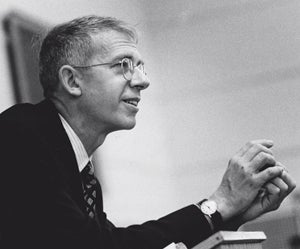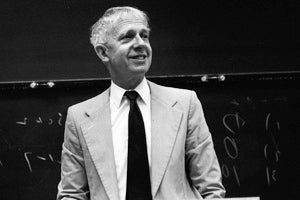Detlev Frederick Vagts ’51, a renowned scholar of international law at Harvard Law School and one of the world’s foremost experts on transnational business problems and the laws affecting international commerce, died Aug. 20.
Vagts’ career at Harvard Law School spanned more than 50 years. He joined the HLS faculty as an assistant professor in 1959 and received tenure in 1962. He was named the Bemis Professor of International Law in 1984. During his tenure at Harvard, he ran the joint J.D./M.B.A. degree program from its inception in 1969 until 2005.
In a message to the HLS community earlier today, Dean Martha Minow said: “We will always remember Det’s contributions to the worlds of public international law, international (and transnational) business transactions, corporate law, comparative lawyering, and legal ethics; his leadership of the Law and Business joint degree program, and his kindness to colleagues and students over the past 50 years. We have lost a friend and colleague who made a real difference in the world.”
Described by a former student as a “formidable generalist,” Vagts was an influential scholar whose expertise addressed the full spectrum of issues related to international law, ranging from public international law to comparative lawyering and professional responsibility, and from international business transactions to securities regulation and corporate law.
Vagts wrote or edited more than 50 books and was the co-author of two casebooks, “Transnational Legal Problems” and “Transnational Business Problems.” When Vagts and Harvard Law Professor Henry Steiner ’55 published the first edition of “Transnational Legal Problems” in 1968, the collaboration marked a milestone in the field of international law. The casebook, currently in its fourth edition, is widely regarded as the leading compendium of materials for scholars and students in the field.

Vagts authored dozens of articles which contributed greatly to legal thinking, including “The International Legal Profession: A Need for More Governance?” (American Journal of International Law, 1996) which addressed problems pertaining to professional behavior in international litigation and advocated regulating international lawyers (including arbitrators).
From 1976 to 1977, Vagts was a counselor on international law for the Department of State, where he worked at the Office of the Legal Advisor helping to negotiate treaties during the transition period between former presidents Ford and Carter.
He served as an associate reporter of the Restatement (Third) of Foreign Relations Law of the United States, working with Andy Lowenfeld and Louis Sohn, under the chairmanship of Lou Henkin. Issued in 1987 by the American Law Institute, the restatement has been widely cited by the courts.
He later served as editor in chief, with Theodor Meron, of the American Journal of International Law, the leading publication in the field (from 1993 to 1998). He previously served as the journal’s book review editor.
In 1991, Vagts was jointly awarded (with EBS Law Professor Werner F. Ebke) the Max Planck Research Award for outstanding international research achievements.
In 2010, Cambridge University Press published a festschrift paying tribute to Vagts: “Making Transnational Law Work in the Global Economy: Essays in honour of Detlev Vagts.” The publication brought together contributions from colleagues at HLS—including Steiner and Professor William Alford ’77—and at the American Society of International Law, as well as from other academics, judges and practitioners, many of them his former students. The collection, edited by Pieter Bekker LL.M. ’91, Rudolf Dolzer LL.M. ’76, S.J.D. 78 and Michael Waibel LL.M. ’08, covers the spectrum of modern transnational law, from international law in general to transnational economic law to transnational lawyering and dispute resolution.
Vagts was born in 1929 in Washington, D.C., to an American mother, Miriam Beard Vagts, a historian and journalist for the New York Times, and a German father, Alfred Vagts, a pioneer German military historian. The family fled Nazi Germany in 1933 and Vagts grew up in Princeton, N.J. and Connecticut. Vagts’s maternal grandparents, Mary Ritter Beard and Charles Beard, renowned historians recognized for their pioneering work in the field of history, played an influential role in his life. (In 1979, Vagts co-authored with his father a historical study of ideas about “balance of power” in international law.) Vagts’ daughter Karen said, “Dad was from a dynasty of historians and inherited the gene.”
At the age of 16, he entered Harvard College and earned an A.B. in history in 1948. In 1951, he earned a LL.B. from Harvard Law School. After HLS, he entered private practice with Cahill Gordon & Reindel in New York City in 1951. From 1953 to 1956, he served as a judge advocate in the United States Air Force. He returned to Cahill, Gordon in 1956, where he worked until joining the HLS faculty in 1959.
Vagts retired from the law school faculty in 2005. In a tribute published in the Harvard Law Bulletin, his former student Pieter Bekker LL.M. ’91 wrote that Vagts’ works and teachings show the marks of a fine comparative law tradition. “In the face of strong U.S. unilateralist and even isolationist tendencies, Vagts displays an unwavering belief in the rule of international law, and the notion that no nation can claim to be above it.”
He leaves his wife Dorothy Larkin Vagts, and two daughters, Karen Vagts and Lydia Vagts and two granddaughters.
